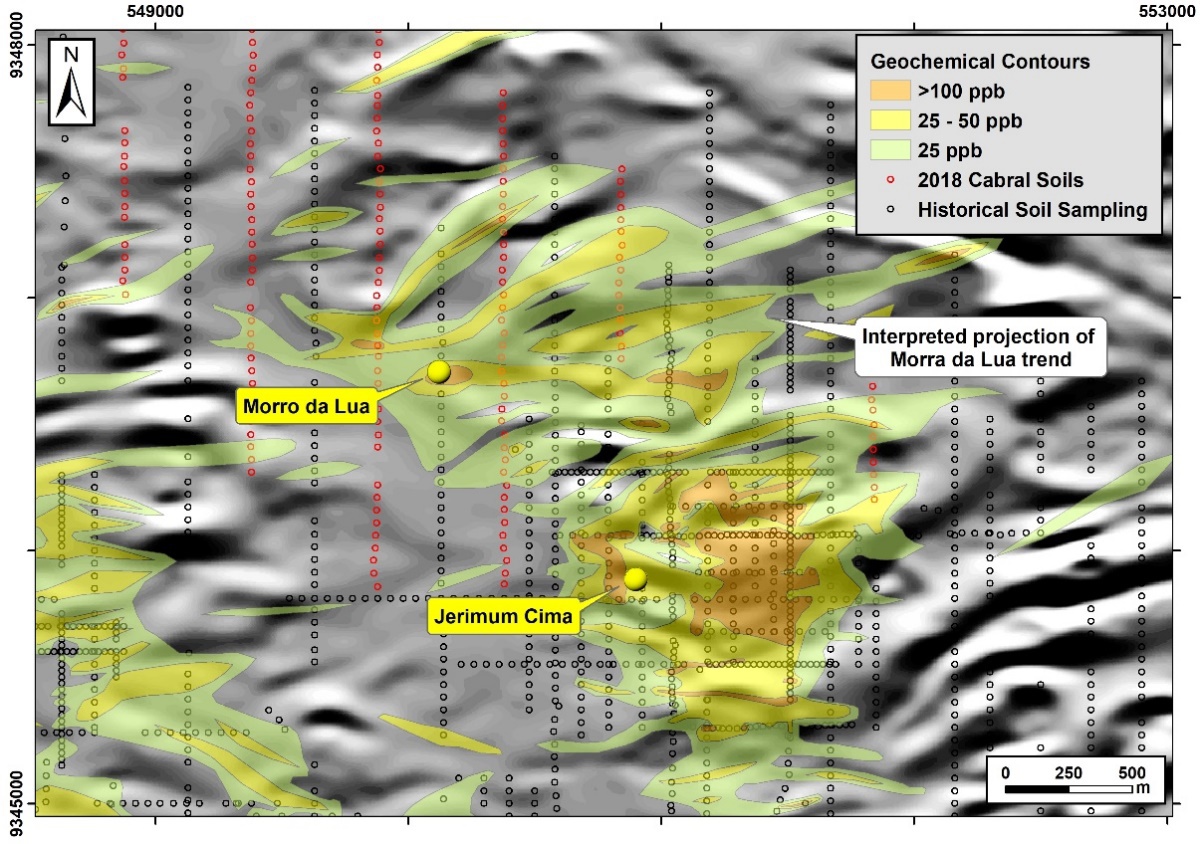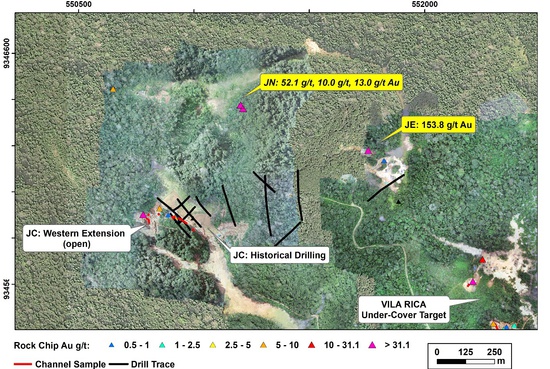Vancouver, British Columbia--(Newsfile Corp. - June 19, 2018) - Cabral Gold Inc. (TSXV: CBR) ("Cabral" or
the "Company") is pleased to announce initial sampling results from two new discoveries, Jerimum
North and Jerimum East, along with further results of surface rock sampling at the Morro da Lua and Jerimum Cima targets, Cuiú Cuiú
Project, Pará State, Brazil.
Highlights include :-
- Seven grab samples returned assay results ranging from 5.5 to 162.4 g/t Au from stockpiles from separate shafts on
vein showings discovered earlier this year at the Morro da Lua
- Channel samples extend the Jerimum Cima target: including 12.4m @ 1.9 g/t Au, 1.7m @ 15.7 g/t Au and 8m @ 1.1 g/t Au.
These are located up to 200m west of historic drilling and significantly extend the strike extent of the Jerimum Cima structure.
All intervals are open in terms of width, and the zone remains open on strike
- A new target, Jerimum North was recently discovered 500m north of Jerimum Cima. Initial rock grab samples returned 52.1
g/t, 13.0 g/t, and 10.0 g/t Au
- Another new target, Jerimum East, has been discovered 800m ENE of Jerimum Cima. It returned a value of 152.6 g/t Au
from a single grab sample
Background
The Cuiú Cuiú Project is located in the Tapajós Province of northern Brazil, the site of the world's largest gold rush and
Brazil's largest placer-gold belt, having produced an estimated 20-30Moz gold. Cuiú Cuiú was the largest historic placer camp in
the Tapajos region, and has been cited by the government as having produced an estimated 2Moz of gold from streams and alluvial
workings covering approximately 850ha, essentially bisecting the property. With the alluvial stream deposits largely exhausted, the
few remaining artisanal workers are now targeting buried alluvial deposits and are also exploiting saprolite bedrock
mineralization.
Previous work on the project was very successful in identifying sources for several of the alluvial workings establishing
Indicated resources of 5.9MMt @ 0.9 g/t Au (for 0.2Moz) and Inferred resources of 19.5MMt @ 1.2 g/t Au (for 0.8Moz)1 in
four deposits. However, the source of many of the alluvial production areas has yet to be determined, and the bedrock to various
saprolite workings is yet to be explored.
The current program of surface exploration is aimed at following up unexplained alluvial, geochemical anomalies and saprolite
mining areas to identify new drill targets. Many of the new targets are returning high grades in initial sampling.

Figure 1: The central part of the Cuiú Cuiú property showing the deposits included in the current resource (red) and the primary
target zones (yellow)
To view an enhanced version of Figure 1, please visit:
http://orders.newsfilecorp.com/files/3900/35340_a1529390209146_4.jpg
Morro da Lua
Morro da Lua is a newly identified target (see press release dated 21st March 2018). It has never been drilled and no
results have ever been reported previously. Results from seven composite rock samples collected material adjacent to seven separate
shafts. These returned values ranging from 5.5 to 162.4 g/t Au (Figure 2).
Ten active artisanal shafts are currently in production or in exploration at Morro da Lua with many other abandoned shafts
scattered over an area which extends for approximately 220m E-W and 210m N-S (Figure 3). Individual veins appear to trend E-W and
detected beneath thick soil cover 8-12m in thickness. Channel samples taken across two individual veins, each approximately 1m in
width, returned grades of 0.3m @ 10.8 g/t Au and 0.3m @ 16.3 g/t Au. An objective for ongoing exploration will be to test for any
halo of lower grade stockwork mineralization, and determine the overall width and strike extent of the zone which is currently
unknown.
Results from 219 infill soil samples recently collected by Cabral at Morro da Lua indicate that a gold-in-soil anomaly extends
1.5km to the east of the current workings. Additional work at Morro da Lua will include deeper auger drill samples through the soil
cover to test for indications of gold mineralization in the weathered bedrock along strike.

Figure 2: Morro da Lua Prospect. Gradients in the 1VD aerial magnetics are interpreted to represent structural breaks. Contours of
soil geochemical data show extension of gold anomalies along strike east to ENE of the prospect area.
To view an enhanced version of Figure 2, please visit:
http://orders.newsfilecorp.com/files/3900/35340_a1529390209474_67.jpg

Figure 3: Morro da Lua shaft positions, grab sampling, and interpreted vein trends.
To view an enhanced version of Figure 3, please visit:
http://orders.newsfilecorp.com/files/3900/35340_a1529390209599_48.jpg
Jerimum Cima
Streams draining the Jerimum Cima ("JC") target area reportedly contained some of the richest historic placer gold
mineralization at Cuiú Cuiú. The JC target is characterized by a gold-in-soil anomaly extending over an area of approximately 1.2 x
1km. Limited previous drilling returned 39m @ 5.13 g/t Au and 18m @ 1.17 g/t Au.
Recent channel sampling west of the previous drilling returned values of 9m @ 2.0 g/t Au including 5m @ 3.16 g/t gold (see press
release dated 21st March 2018), and 12.4m @ 1.9 g/t Au, 8m @ 1.1 g/t Au and 1.7m @ 15.7 g/t
Au (Figure 4). All of the most recent channel samples are open in width under soil cover to the north. The mineralized zone is
currently estimated to be at least 15m in width and remains open to the west.

Figure 4: Jerimum Cima - channel sampling results in relation to historical sampling, and example of sheeted veining in
sericite alteration envelope.
To view an enhanced version of this graphic, please visit:
https://orders.newsfilecorp.com/files/3900/35340_fig4enhanced.jpg
Jerimum North and Jerimum East
Exploration in and around the JC target has identified two other new mineralized zones Jerimum North ("JN") and Jerimum East
("JE"), both of which were previously unknown (Figure 5). Rock chip grab sampling of mineralized rock adjacent to an abandoned
shaft at JN, which is located 500m north of JC, returned values of 52.1 g/t, 13.0 g/t, and
10.0 g/t Au. Reconnaissance auger drilling has recently been conducted, returning traces of gold
in pan concentrates from the colluvial horizon at the base of the soil profile which is on average 6m thick. Programs will continue
with laboratory analysis of interface samples across the colluvial-saprolite zones, and reprocessing and extension of ground
magnetics grids to trace the extent of the structures.
JE is similarly a new target located approximately 800m ENE of the JC target. A grab sample taken from quartz vein material
immediately adjacent to a abandoned workings returned 152.6 g/t Au. Similarly, deep auger sampling of soils and evaluation
of ground magnetic data are in progress to determine the size of this target. The extent of the mineralization at both JN or JE is
currently unknown. Neither target has previously received any surface sampling or drilling.

Figure 5: JC target area showing location of newly identified JN and JE targets
To view an enhanced version of Figure 5, please visit:
http://orders.newsfilecorp.com/files/3900/35340_a1529390210255_15.jpg
Alan Carter, President & CEO commented "The presence of high-grade gold values on surface from newly identified targets at Morro
da Lua, Jerimum North (JN) and Jerimum East (JE) continues to impress us and highlights the potential for significant untested
high-grade gold mineralization at Cuiú Cuiú."
The Company expects to report additional surface sample assay results over the coming weeks and months from several areas listed
below which will be used to identify and prioritize drill targets during the third quarter of 2018.
- The MG (Moreira Gomes) Target Area. MG already has an Inferred resource of 8.6MMt @ 1.45 g/t Au. Nearby targets
include Machichie, Guarim, Vila Rica and Germano
- The Central — Pau de Merenda Target Corridor. A 1km wide NW-trending zone that already includes an Indicated resource
of 5.9MMt @ 0.90 g/t Au and Inferred resources of 8.7MMt @ 1.13 g/t Au at Central. Historic drill results from Pau de Merenda
target 2km to the north include 30m @ 1.1 g/t Au, 47m @ 1.8 g/t Au and 9m @ 5.1 g/t Au
- The JB Target Area. JB currently has a small Inferred resource of 2.1MMt @ 0.87 g/t Au but is open along strike and at
depth
- The Miraboa Target Area. This region has produced a significant amount of gold from streams and exhibits several
compelling gold-in-soil and coincident magnetic anomalies but has never been the subject of any drilling or systematic
sampling
Gold analysis was conducted by SGS method FAA505 (fire assay of 50g charge), with higher grade samples checked by FAA525. The
Morro da Lua grab samples were analysed by screen fire assay. Analytical quality is monitored by certified references and blanks.
Until dispatch, samples are stored under the supervision the Company's exploration office. The samples are couriered to the assay
laboratory using a commercial contractor. Pulps are returned to the Company and archived. Channel sampling is conducted using a
hand-trenching tool over exposed faces to maintain a consistent sample. Under the agreement with the Cuiú Cuiú condominium, local
artisanal operators can process mineralization to a depth of 30m, unless otherwise negotiated. Shafts generally stop at or above
the water-table. Historical drilling results are reports as down-hole length weighted intersections unless otherwise stated. The
reported channel samples results are taken at right-angles to the strike of the structure and represent true-widths. Reconnaissance
auger drilling is conducted as an initial test with the basal colluvial and upper saprolite samples separately panned for visual
checks of gold. A second phase of grid-based auger drilling will be conducted to verify anomalies with split samples from the
saprolite interval and geochemical tests of the soil and coarse fractions in the colluvium directly above the interface.
About Cabral Gold Inc.
The Company is a junior resource company and is engaged in the identification, exploration and development of mineral
properties, with a primary focus on gold properties located in Brazil. The Company owns the Cuiú Cuiú gold project located in the
Tapajos Region within the state of Para in northern Brazil.
FOR FURTHER INFORMATION PLEASE CONTACT:
Alan Carter
President and Chief Executive Officer
Cabral Gold Inc.
Tel: 604.676.5660
Dr.Adrian McArthur, B.Sc. Hons, PhD. FAusIMM., a consultant to the Company as well as a Qualified
Person as defined by National Instrument 43-101, supervised the preparation of the technical information in this news
release.
Neither the TSX Venture Exchange nor its Regulation Services Provider (as such term is defined in the policies of
the TSX Venture Exchange) accepts responsibility for the adequacy or accuracy of this release.
Forward-looking Statements
This news release contains certain forward-looking information and forward-looking statements within the meaning of applicable
securities legislation (collectively "forward-looking statements"). The use of the words "will", "expected" and similar expressions
are intended to identify forward-looking statements. These statements involve known and unknown risks, uncertainties and other
factors that may cause actual results or events to differ materially from those anticipated in such forward-looking statements.
Such forward-looking statements should not be unduly relied upon. This news release contains forward-looking statements and
assumptions pertaining to the following: strategic plans and future operations, and results of exploration. Actual results achieved
may vary from the information provided herein as a result of numerous known and unknown risks and uncertainties and other factors.
The Company believes the expectations reflected in those forward-looking statements are reasonable, but no assurance can be given
that these expectations will prove to be correct.
1 Micon NI 43-101 resource estimate reported June 7 2018.
